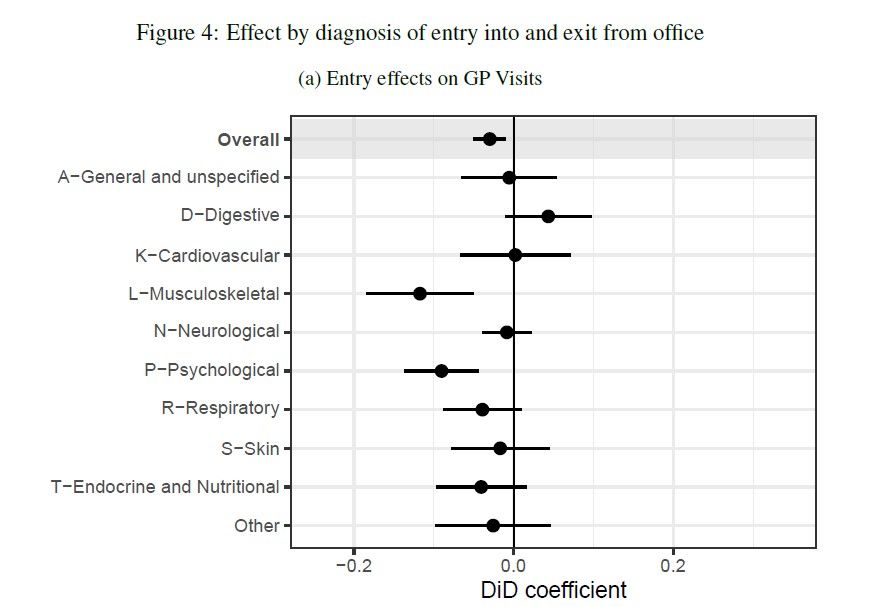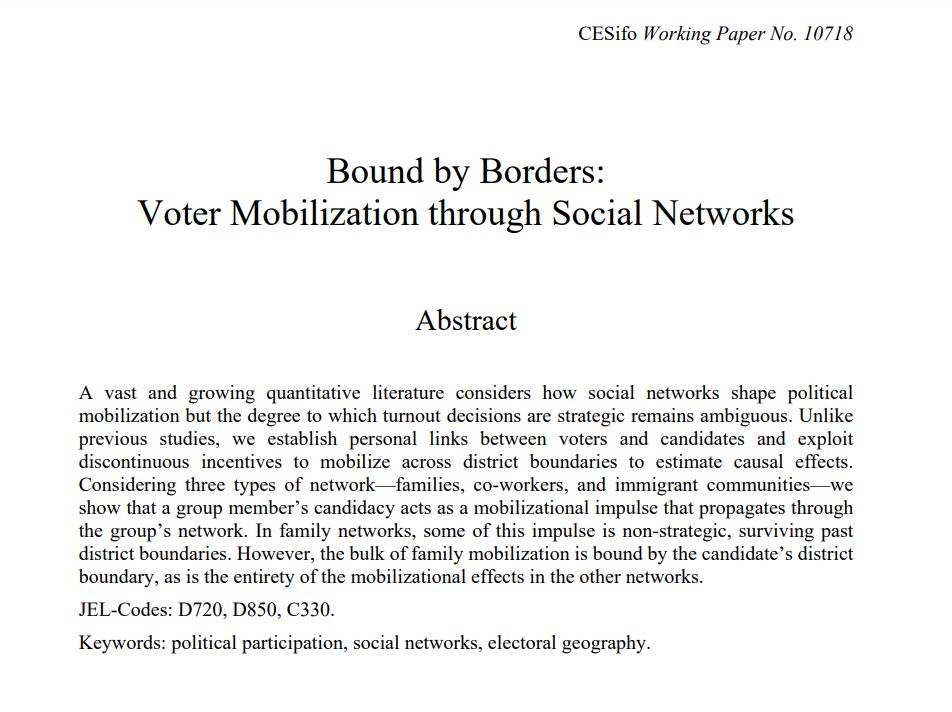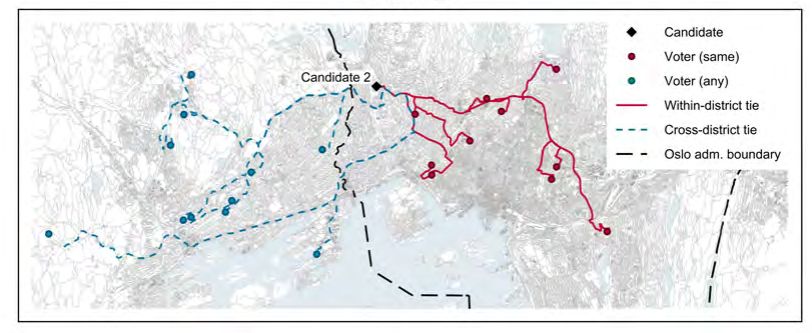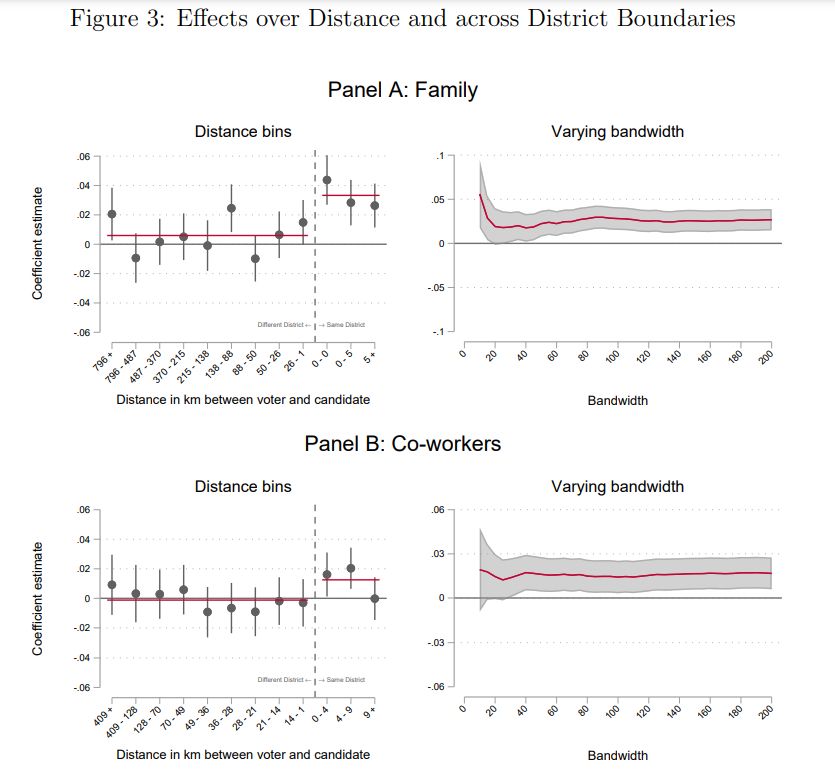Jon Fiva
@fiva.no
Economics professor at the Norwegian Business School | www.jon.fiva.no
Norway votes in 11 days 🇳🇴
More than a century after PR was introduced, women still hold under half the seats. In Norway’s closed-list system, nomination order is decisive—women are projected to occupy ~44% of seats in 2025 (based on 2021 party seat shares across districts).
More than a century after PR was introduced, women still hold under half the seats. In Norway’s closed-list system, nomination order is decisive—women are projected to occupy ~44% of seats in 2025 (based on 2021 party seat shares across districts).

August 28, 2025 at 12:59 PM
Norway votes in 11 days 🇳🇴
More than a century after PR was introduced, women still hold under half the seats. In Norway’s closed-list system, nomination order is decisive—women are projected to occupy ~44% of seats in 2025 (based on 2021 party seat shares across districts).
More than a century after PR was introduced, women still hold under half the seats. In Norway’s closed-list system, nomination order is decisive—women are projected to occupy ~44% of seats in 2025 (based on 2021 party seat shares across districts).
Utjevningsmandatene i Norge deles ut i runder til partiene som "mest fortjener det". Her er hvordan det så ut i 2021 (tror jeg, med forbehold om feil😅).

August 27, 2025 at 2:04 PM
Utjevningsmandatene i Norge deles ut i runder til partiene som "mest fortjener det". Her er hvordan det så ut i 2021 (tror jeg, med forbehold om feil😅).
MDG ber velgere stemme taktisk for å passere sperregrensa (mdg.no/taktisk). Illustrasjonen 👇 er litt optimistisk, men viser en viktig diskontinuitet i valgsystemet. I 2021 ville 1720 flere stemmer til MDG gitt 4 ekstra mandater – tatt fra FrP (2), SV og H.

August 27, 2025 at 2:03 PM
MDG ber velgere stemme taktisk for å passere sperregrensa (mdg.no/taktisk). Illustrasjonen 👇 er litt optimistisk, men viser en viktig diskontinuitet i valgsystemet. I 2021 ville 1720 flere stemmer til MDG gitt 4 ekstra mandater – tatt fra FrP (2), SV og H.
Det er en relevant innvending. Her er noen figurer fra et foredrag jeg holdt i forrige uke. Som du ser er det også svært få treff på «sykepenger».
Røde sirkler: R, SV, AP
Grønne firkanter: SP, KRF, V
Blå trekanter: H, FRP
Røde sirkler: R, SV, AP
Grønne firkanter: SP, KRF, V
Blå trekanter: H, FRP


June 23, 2025 at 9:25 PM
Det er en relevant innvending. Her er noen figurer fra et foredrag jeg holdt i forrige uke. Som du ser er det også svært få treff på «sykepenger».
Røde sirkler: R, SV, AP
Grønne firkanter: SP, KRF, V
Blå trekanter: H, FRP
Røde sirkler: R, SV, AP
Grønne firkanter: SP, KRF, V
Blå trekanter: H, FRP
In Oslo this Monday? We're running a Political Economics Mini Workshop—reach out if you'd like to attend.
Presentations by Enrico Cantoni, @annkristinkolln.bsky.social, Sara Cools, Stine Hesstvedt, and @siggi-econ.bsky.social.
Presentations by Enrico Cantoni, @annkristinkolln.bsky.social, Sara Cools, Stine Hesstvedt, and @siggi-econ.bsky.social.

June 21, 2025 at 9:31 AM
In Oslo this Monday? We're running a Political Economics Mini Workshop—reach out if you'd like to attend.
Presentations by Enrico Cantoni, @annkristinkolln.bsky.social, Sara Cools, Stine Hesstvedt, and @siggi-econ.bsky.social.
Presentations by Enrico Cantoni, @annkristinkolln.bsky.social, Sara Cools, Stine Hesstvedt, and @siggi-econ.bsky.social.
The newly released 2025 election lists reveal a persistent pattern: in Norway, women remain underrepresented at the top—despite 100+ years of proportional representation.
June 17, 2025 at 11:51 AM
The newly released 2025 election lists reveal a persistent pattern: in Norway, women remain underrepresented at the top—despite 100+ years of proportional representation.
That's interesting. Using a failed re-nomination design, @nedregardoda.bsky.social and I find that lame-duck status has a strong negative effect on legislative effort.


May 13, 2025 at 10:57 AM
That's interesting. Using a failed re-nomination design, @nedregardoda.bsky.social and I find that lame-duck status has a strong negative effect on legislative effort.
We also study longevity using a RD design on close parliamentary elections (1921-1981).
Unlike U.S.-based studies claiming big lifespan gains from winning office, we find no RD jump.
Lines up w. @statmodeling.bsky.social’s skepticism:
🔗 statmodeling.stat.columbia.edu/2020/07/02/n...
Unlike U.S.-based studies claiming big lifespan gains from winning office, we find no RD jump.
Lines up w. @statmodeling.bsky.social’s skepticism:
🔗 statmodeling.stat.columbia.edu/2020/07/02/n...

May 13, 2025 at 10:51 AM
We also study longevity using a RD design on close parliamentary elections (1921-1981).
Unlike U.S.-based studies claiming big lifespan gains from winning office, we find no RD jump.
Lines up w. @statmodeling.bsky.social’s skepticism:
🔗 statmodeling.stat.columbia.edu/2020/07/02/n...
Unlike U.S.-based studies claiming big lifespan gains from winning office, we find no RD jump.
Lines up w. @statmodeling.bsky.social’s skepticism:
🔗 statmodeling.stat.columbia.edu/2020/07/02/n...
Could mayors just be delaying care while in office? We checked. Comparing one-term to multi-term mayors, we see no spike in GP visits after leaving office.

May 13, 2025 at 10:42 AM
Could mayors just be delaying care while in office? We checked. Comparing one-term to multi-term mayors, we see no spike in GP visits after leaving office.
What do we find?
✅ Mayors get a big income boost when elected.
🩺 But contrary to common narratives, winning office reduces visits to general practitioners—especially for psychological and musculoskeletal issues.
✅ Mayors get a big income boost when elected.
🩺 But contrary to common narratives, winning office reduces visits to general practitioners—especially for psychological and musculoskeletal issues.

May 13, 2025 at 10:41 AM
What do we find?
✅ Mayors get a big income boost when elected.
🩺 But contrary to common narratives, winning office reduces visits to general practitioners—especially for psychological and musculoskeletal issues.
✅ Mayors get a big income boost when elected.
🩺 But contrary to common narratives, winning office reduces visits to general practitioners—especially for psychological and musculoskeletal issues.
Action photos from @maxemilking.bsky.social great PhD defense today at the Norwegian Business School.
Many thanks to the excellent committee, @johannarickne.bsky.social, Guido Friebel, and @hsigstad.bsky.social.
Many thanks to the excellent committee, @johannarickne.bsky.social, Guido Friebel, and @hsigstad.bsky.social.


January 14, 2025 at 1:21 PM
Action photos from @maxemilking.bsky.social great PhD defense today at the Norwegian Business School.
Many thanks to the excellent committee, @johannarickne.bsky.social, Guido Friebel, and @hsigstad.bsky.social.
Many thanks to the excellent committee, @johannarickne.bsky.social, Guido Friebel, and @hsigstad.bsky.social.
Excited to be back at my alma mater @ntnu-econ.bsky.social to present "Vetting for Virtue: Democracy’s Challenge in Excluding Criminals from Office" (w/ siggi1.bsky.social and R. Sørensen) at #Forskermøtet.
Here is a graph giving the big picture:
Here is a graph giving the big picture:

November 28, 2024 at 6:18 AM
Excited to be back at my alma mater @ntnu-econ.bsky.social to present "Vetting for Virtue: Democracy’s Challenge in Excluding Criminals from Office" (w/ siggi1.bsky.social and R. Sørensen) at #Forskermøtet.
Here is a graph giving the big picture:
Here is a graph giving the big picture:
In @alicirone.bsky.social et al. (2021), we find that that 15% of winnable spots are contested. In contrast, about 75% of open nominations in the US House are contested.
Nomination fights typically occur between individuals with equal seniority within the party.
www.cambridge.org/core/journal...
Nomination fights typically occur between individuals with equal seniority within the party.
www.cambridge.org/core/journal...

November 26, 2024 at 9:16 PM
In @alicirone.bsky.social et al. (2021), we find that that 15% of winnable spots are contested. In contrast, about 75% of open nominations in the US House are contested.
Nomination fights typically occur between individuals with equal seniority within the party.
www.cambridge.org/core/journal...
Nomination fights typically occur between individuals with equal seniority within the party.
www.cambridge.org/core/journal...
These figures show the fraction of legislators voting in Parliament on a given day by quarters from the nomination meeting.
- Left: Nomination fight losers.
- Right: All other incumbents.
- Left: Nomination fight losers.
- Right: All other incumbents.

November 26, 2024 at 9:04 PM
These figures show the fraction of legislators voting in Parliament on a given day by quarters from the nomination meeting.
- Left: Nomination fight losers.
- Right: All other incumbents.
- Left: Nomination fight losers.
- Right: All other incumbents.
#SaturdayGraph: While most Norwegian political parties select positively on lawfulness, two parties stand out, the anti-establishment parties on the far-left (R) and far-right (FrP)

November 16, 2024 at 10:47 AM
#SaturdayGraph: While most Norwegian political parties select positively on lawfulness, two parties stand out, the anti-establishment parties on the far-left (R) and far-right (FrP)
We find that in municipality-years where the local party organization was already active (i.e., they ran a list in the previous election cycle), candidate vetting appears particularly strong.

October 21, 2024 at 3:40 PM
We find that in municipality-years where the local party organization was already active (i.e., they ran a list in the previous election cycle), candidate vetting appears particularly strong.
Through a series of counterfactual exercises, we demonstrate that the most significant reduction in criminal involvement occurs already at the nomination stage. Voter influence in excluding candidates with criminal histories is small.

October 21, 2024 at 3:40 PM
Through a series of counterfactual exercises, we demonstrate that the most significant reduction in criminal involvement occurs already at the nomination stage. Voter influence in excluding candidates with criminal histories is small.
Using admin data from Norway, we demonstrate that electoral processes can indeed effectively screen out individuals with criminal backgrounds from elected bodies.

October 21, 2024 at 3:40 PM
Using admin data from Norway, we demonstrate that electoral processes can indeed effectively screen out individuals with criminal backgrounds from elected bodies.
Previous studies show that voters may be reluctant or unable to remove candidates who prioritize their own interests over the public good. Trump is a prominent example

October 21, 2024 at 3:39 PM
Previous studies show that voters may be reluctant or unable to remove candidates who prioritize their own interests over the public good. Trump is a prominent example
The belief that democratic processes are sufficient to keep dishonest individuals out of office has deep historical roots. For example, in defense of the electoral college, Alexander Hamilton, the likely author of the 68th essay of The Federalist Papers, wrote:

October 21, 2024 at 3:39 PM
The belief that democratic processes are sufficient to keep dishonest individuals out of office has deep historical roots. For example, in defense of the electoral college, Alexander Hamilton, the likely author of the 68th essay of The Federalist Papers, wrote:
Group Identities and Parliamentary Debates
New updated version of my paper with @nedregardoda.bsky.social and Henning Øien
www.jon.fiva.no/docs/FivaNed...
New updated version of my paper with @nedregardoda.bsky.social and Henning Øien
www.jon.fiva.no/docs/FivaNed...


October 8, 2024 at 6:52 PM
Group Identities and Parliamentary Debates
New updated version of my paper with @nedregardoda.bsky.social and Henning Øien
www.jon.fiva.no/docs/FivaNed...
New updated version of my paper with @nedregardoda.bsky.social and Henning Øien
www.jon.fiva.no/docs/FivaNed...
Bound by Borders: Voter Mobilization through Social Networks
New CESifo wp. with Gary Cox and @maxemilking.bsky.social
www.cesifo.org/en/publicati...
New CESifo wp. with Gary Cox and @maxemilking.bsky.social
www.cesifo.org/en/publicati...



October 23, 2023 at 7:47 PM
Bound by Borders: Voter Mobilization through Social Networks
New CESifo wp. with Gary Cox and @maxemilking.bsky.social
www.cesifo.org/en/publicati...
New CESifo wp. with Gary Cox and @maxemilking.bsky.social
www.cesifo.org/en/publicati...




